Last Updated on January 8, 2024 by Greg Gillson
So, why do birds throw seeds out of the feeder?
Here are the top 3 of the 7 reasons birds throw seed from feeders:
Birds throw seeds they don’t like from the feeder, searching for their favorite. Birds throw the inedible outer seed hulls from the feeder, eating the edible kernel. Birds may accidentally knock seed out of the feeder.
Below I identify 7 reasons why birds might throw seeds out of your feeder. Once we understand those reasons, we are in a better position to solve this common feeder problem. Throughout this article I link to other articles that solve some of these problems.
Only one of these reasons is accidental, though. In the other six cases, birds are throwing seed from the feeder on purpose. Why would they do this? Let’s find out.
Birds throw seed hulls from the feeder
In general, birds do not eat the entire whole seed.
Birds eat the meat of the seed, the kernel. They discard the seed’s fibrous outer covering, the hull. If you examine the seeds under the feeder you may see that it is mostly the two inedible halves of the hull that have been tossed on the ground. This is true even for tiny seeds–they all have an outer covering that must be discarded before they reach the edible kernel.
Doves and quail eat the entire seed. They use their gizzards to grind it all up.
I have written an article comparing different types of no mess and waste free bird seeds. Most of these have seeds with the hulls removed.
Finches and sparrows “chew.” Their jaws move both up and down and also sideways, in a circle. Thus they are able to use their bill and tongue and split the seeds in half, extract and swallow the kernel, and spit out the hulls. They sit on the feeder and chew and spit. Okay, it’s not really spitting, more just letting the inedible pieces fall from their mouths. These are the birds responsible for much of the mess.
Chickadees and nuthatches are not able to chew in this way. Thus, they take one seed at a time, such as a sunflower seed, and fly off with it to a nearby perch. They hold the seed with their toes against the tree bark to wedge it tightly. Then they pound the seed open with hammer blows of their beak. In fact, this is very action is the origin of the nuthatch’s name.
This type of “one seed at a time” and eating it elsewhere makes for a very neat bird feeder. Don’t we wish all birds were so non-messy?
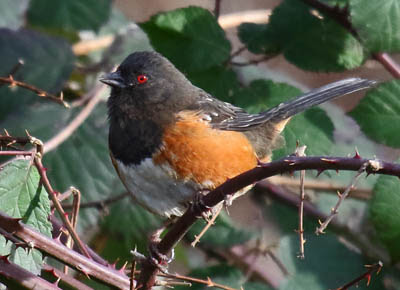 |
| Spotted Towhees habitually kick when they feed. Greg Gillson. |
Some birds kick seeds out of the feeder by habit
Towhees, Fox Sparrows, White-crowned Sparrows and some other ground-feeding birds habitually kick over leaf litter as they feed, searching under fallen detritus for a snack. They can’t help themselves when they get on the feeder. Kicking is how you eat. Off flies perfectly good seed thrown from the feeder!
The Cornell Lab of Ornithology (source) calls this maneuver of the towhee the “double-scratch.” They quickly kick and scratch the ground, hopping forward and back with both feet at once. Then they look to see if they’ve unearthed any goodies to eat.
Birds throw poor quality seeds from the feeder
The components of bird seed are harvested by machine. The plants are cut and the seeds separated from the stalk and leaves. By cutting all at once there will be some mature seeds and some not quite ready. Some seeds may not have anything in them.
Birds weigh and examine and test seeds to see if they have a nice meaty center, before they open them. If there’s not food inside, then they are discarded. There’s no sense expending energy on an empty seed. A bird who can’t figure out the difference won’t long survive.
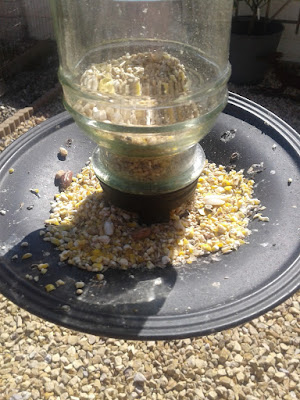 |
| Birds ate the sunflower seeds, but not the cracked corn. |
Birds throw seeds they don’t like from the feeder
While you may think you’re getting a great deal on bird seed, the birds may have other ideas.
Many of the cheaper mixed bird seed packages contain more than half seeds that most birds don’t like. Such seed includes red milo, wheat, and cracked corn.
What do you do with food on your plate you don’t like? Yep, into the trash it goes. Birds throw out the seeds from the feeder they don’t want in order to get to the seeds they do want.
What does this mean? It is the equivalent of buying a whole bag of mixed bird seed, bringing it home and immediately dumping half of it out on the ground! No wonder it creates a mess!
Most birds at the feeder love black oil sunflower seeds. Many sparrows also love white proso millet. Choose bird seed with mostly these two ingredients.
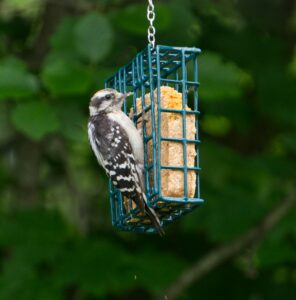
Birds throw germinating seeds from the feeder
Is wet bird seed bad for birds?
Not at first, during or immediately following a rainstorm. Wet bird seed may clump together and be hard to eat.
If bird seed gets soaked through it may germinate and start growing. Birds will not eat germinating seeds. Birds will throw such “bad” seed out of the feeder. And it leads to the next problem if not quickly cleaned up.
Birds throw moldy bird seed from the feeder
If seed sits in the bird feeder and stays wet it will become mushy and dank-smelling. That’s mold and bacteria growing.
Can birds eat moldy bird seed? They may try. And it may end up making them sick or killing them. If they don’t eat it, they may throw it out of the feeder, making quite a mess.
More than likely, though, they’ll abandon a feeder that has moldy bird seed, especially if it is wet.
For the same reason, birds may not eat old seed left over from last year. Start with fresh seed every fall.
Birds accidentally spill seed from the feeder
Sometimes the seed is accidentally knocked out of a hopper or tray feeder by active birds.
Or when pulling one seed from a tube feeder, another seed or two falls to the ground.
For all these reasons, birds may throw out seed from the feeder, making quite a mess.
So, that begs the question: What do you do about it?
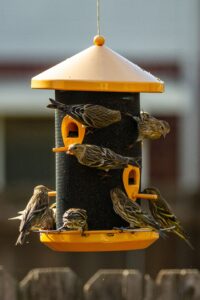
For that, please read my article: End the mess of feeding wild birds!
Wrapping Up
Here is a run down of all the reasons why birds deliberately spill seed from the bird feeder.
- They throw out seed hulls
- Some birds kick seeds out by habit
- Birds throw out poor quality seeds
- They will discard seeds they don’t like
- They will remove germinating seeds
- Birds throw moldy bird seed out
- They accidentally spill seed from the feeder
Frequently Asked Questions
Can I throw bird seed on the ground?
While throwing bird seed on the ground seems like a simple way to feed our feathered friends, there are some things to consider before doing so:
Benefits:
- Accessibility: Ground feeding makes the food readily available to a wider variety of birds, including ground birds like sparrows and doves, who might not use hanging feeders.
- Natural foraging: Scattering seeds mimics their natural foraging behavior, stimulating their instincts and providing enrichment.
- Supplemental food: Especially during harsh winters or times of food scarcity, ground feeding can offer a valuable source of nutrition for birds.
Drawbacks:
- Unwanted guests: Scattered seeds can attract unwanted animals like squirrels, raccoons, and even rodents, who might outcompete birds for the food.
- Mess and waste: Uneaten seeds can create a mess, attracting insects and potentially causing hygiene issues.
- Disease spread: Large gatherings of birds on the ground can increase the risk of disease transmission between them.
- Predation risk: Open ground feeding areas can expose birds to predators like cats and hawks.
Alternatives:
- Platform feeders: Consider using a designated platform feeder specifically designed for ground feeding birds. This keeps the food contained and minimizes mess.
- Designated areas: Choose a specific area away from trees and structures where you can scatter seeds regularly, making it easier to manage and monitor.
- Variety is key: Offer a mix of seed types and sizes to cater to different birds’ preferences and dietary needs.
- Cleanliness is crucial: Regularly clean up uneaten seeds and droppings to prevent attracting unwanted animals and maintaining hygiene.
Do birds tell each other where food is?
The question of whether birds tell each other where food is has intrigued us for centuries, and the answer is not a simple yes or no. The truth lies somewhere in between, a fascinating blend of instinct, observation, and potentially limited communication.
Evidence for Communication:
- Flocking behavior: Many birds, like swallows and starlings, forage in large groups. Their movements often suggest a degree of social communication, potentially alerting others to a newfound food source.
- Alarm calls: Birds use specific calls to warn others of danger, which could extend to sharing information about abundant food sources.
- Mimicry: Some birds, like mockingbirds, can mimic the calls of other species, and some researchers believe this might include calls that signal food availability.
Limitations of Communication:
- Specificity: We lack definitive evidence that bird communication explicitly identifies the location and type of food. It might be more general alerts about food presence in a specific area.
- Individual Differences: Bird behavior varies greatly across species and even within individuals. Some might be more adept at sharing information than others.
- Unproven Mechanisms: While we see suggestive behaviors, the precise mechanisms of how birds might communicate food-related information remain unclear.
Overall:
While the exact extent and mechanisms of birds sharing food information are still being explored, there’s growing evidence that some form of communication plays a role. Their social behavior, alarm calls, and occasional mimicry suggest a system beyond just individual foraging.
Do wild birds recognize who feeds them?
While definitive proof is elusive, several fascinating lines of evidence suggest that wild birds can indeed recognize those who feed them:
Food association: Birds are intelligent creatures, readily forming associations between positive experiences and the source of those experiences. If you consistently provide them with food, they might start associating your presence with the arrival of delicious treats.
Patterns and routines: Birds are incredibly observant and can remember patterns and routines. If you feed them at specific times in specific locations, they might learn to anticipate your arrival and seek you out.
Visual cues: While not every bird has exceptional eyesight, some species can recognize individual humans based on distinctive features like clothing or posture. This recognition could facilitate trust and familiarity.
Vocalization: Some birds might even learn to associate your voice with the appearance of food. Hearing your familiar voice could trigger them to approach the feeder in anticipation of a tasty meal.
Changes in behavior: Birds often behave differently around those they recognize as familiar and friendly. They might approach feeders more readily, vocalize more freely, or even perch closer to you compared to unfamiliar individuals.


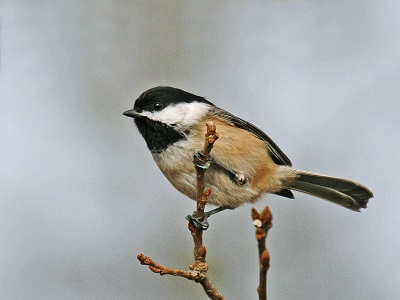
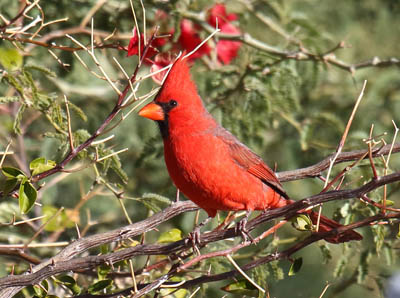
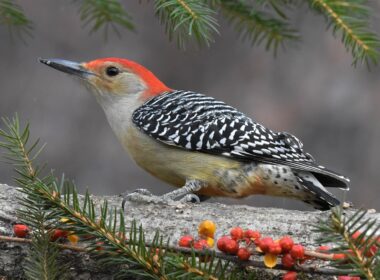
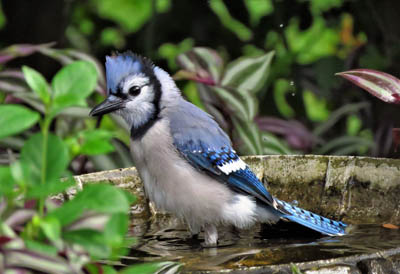
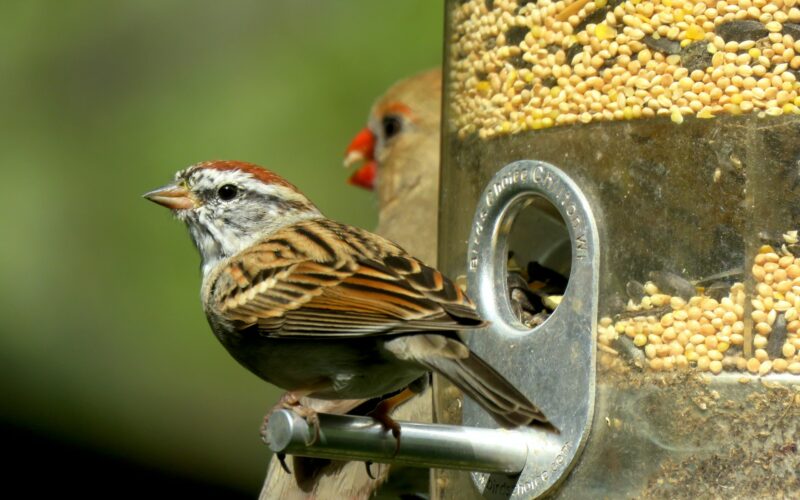

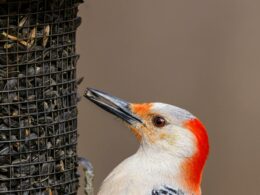
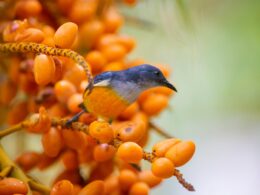
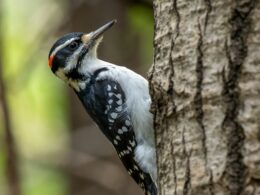
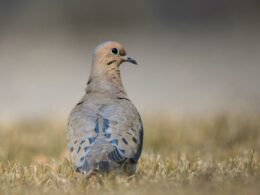
Nice article, Greg. Some reasons I was aware of and some not. I use strictly sunflower in a hanging tube feeder and white millet in a ground level feeder. Zero waste.
Sounds like the exact setup I recommend!
Good recommendations, but what to do with chipmunks and squirrels stealing seeds from lower feeders? I also would like to keep bully common sparrows away,any ideas?
Thank you.
The solution to REDUCE use by squirrels and sparrows is to feed black oil sunflower seed in a plastic tube feeder with NO tray or seed catcher at the bottom.
See Amazon on this page for ideas: https://amzn.to/3uUbszN
Squirrels can jump up 5 feet to a feeder. So a tall pole with squirrel baffle placed about 4-1/2 feet high, at least. Squirrels can jump sideways about 10 feet, especially if they get on a roof or fence or tree above the feeder. So keep the feeder farther from such places.
You may provide squirrels with corn cob squirrel feeders so they aren't as determined to get in the bird feeders. May or may not work.
How do I keep blackbirds from scaring away all my song birds?
Please see my article on this topic:
https://whatbirdsareinmybackyard.com/2020/04/how-to-get-rid-of-grackles-blackbirds-starlings-at-bird-feeder.html
I'm sure you realize birds prefer fresh seeds in a hull more than seeds that sit in a warehouse for months
Yes, indeed! That's problem number 4 of 25 reasons birds don't come to your feeder:
https://whatbirdsareinmybackyard.com/2021/06/why-birds-arent-coming-to-feeder.html
I use fruit n nut mix. Everybody comes and eats. Almonds sunflower peanut mills and sunflower seeds out of shell
Good choice! Wagners has that mix.
I feed the birds,but some despite the recommendation damn near choke on food provided. Robins are so use 2 me,they will land at my feet. I shall continue to feed them,where am going wrong xxx
I'm not sure what you mean by birds choking on food.
Birds can provide us much joy, and they can learn to trust us a bit.
I just bought new Black Oilers and filled feeders..I'm watching the Red Polls 3ft from my window. They have emptied the feeders in the hopper in one day, (about 4qts) and large two tiered tube feeder. It is all over the ground I can see them simply flinging the seed out. I don't understand why they are doing this. It is seed from L&M fleet and is Prairie Lakes Seed. Could this have been a weather-related issue with the seed?
This is very strange. Redpolls are invading because the cone crop in the boreal forest is poor this year. They should be starving, not picky!
First, double check that it is the whole seed and not just the outside inedible hulls that they are throwing away.
Then, gather up some seeds from the ground and open them up to see if they have edible kernels inside.
Third, check to see if sparrows are hopping under the feeder and eating the sunflower seeds, or whether they don't like the seeds either.
Fourth, limit the amount of seed you put in your feeder to only what you think the birds can reasonably eat by noon. You don't want the mess.
Finally, I'm jealous that you have redpolls. I've only seen them a couple of times in my life.
Redpolls will like Niger seed in a thistle feeder or sock better than sunflower seeds.
GREAT article.. taught me a lot! In fact, due to this issue with the STARLINGS in particular, I have just begun replacing the primarily hopper feeders I use with the tubular-types. Also noticed that they (starlings) tend to frequently hold their beaks wide open at the seeds along the rims prior to "tossing" them out and to the ground. Is this an act of 'test-SMELLING' the seed (it IS stock from LAST winter's season)!?
Hmm… don't know what the starlings are doing. Maybe if you watch closely, you'll figure it out. Or maybe you'll figure out how to keep them out of your feeders and will never know….!!!
Taste is a much stronger sense than smell for most birds.
Very interesting and educational info, thank you! I am just wondering why the doves I feed do eat the sunflower seeds, but there are never any hulls left behind! I have watched to see if it just takes some time before they are dropped, but no, it doesn't happen. What can be happening?
Suzy,
Good observation there!
Doves do indeed eat the sunflower seed whole– shells and all!
Their large gizzard grinds it up.
Wow! Thank you so much for your reply, and so quick! Those amazing little (no so little) guys – I watch carefully to make sure they don't beat the purple finches to the seeds, but this new info fascinates me. Birds do, in general, so I will be keeping up with your page and continuing to learn. Thank you!!
I have magpies attacking the bird feeder. They fly towards it, turn and hit it with their feet . This spills seeds on to the ground and they then fly down to eat .self taught 😊
Smart birds!
I have 2 small bird (finches, yellow, etc) feeders. How do I keep pigeons away. They hit the feeders with their chest or wings and eat from the ground and poop all over
That does sound like a problem. A longer hanging tube feeder will allow the finches to feed. The pigeons are not able to feed from them. That doesn't stop them from striking the feeder to knock seed out but if it swings they may give up.
Hi! I have a woodpecker that’s knocking all the seed out of the feeder with it’s head. Swiping the bottom, which empty’s the feeder in about a hour. It’s pure sunflower seeds we have in the feeder from a local farm. Any advice on why the woodpeckers doing this or what we can do to deter it?
I have a woodpecker that also eats sunflower seeds. The first feeder just had too large of feeding port and was too light weight. All birds that wiggled the feeder caused seed to spill out.
I bought a tube feeder that seems to work well. It's the iBird brushed copper 6-ports. Let's see if this link to Amazon works:
https://www.amazon.com/dp/B09KMVJYY6